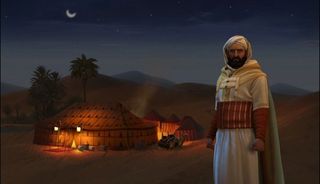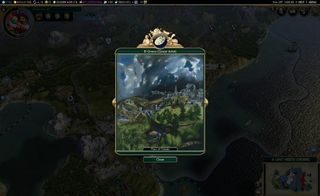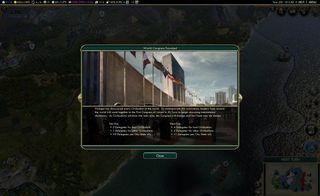
The evil Assyrian Empire has finally showed its hand, proving what a threat it is to the world. The once mighty Zulus have fallen to their advancing armies, as have my long-time Swiss allies in the city-state of Zurich. In vanilla Civ V, we may have been left without recourse this far into the modern age. But this is a Brave New World, and I have a plan.
The second expansion for Civilization V most prominently features major overhauls to diplomacy, culture, and trade. While the previous expansion, Gods & Kings, put its emphasis on the early to mid game, Brave New World's new features are most strongly felt in the post-Renaissance eras, as the new World Congress adds a complex and exciting diplomatic layer to the often drawn-out tail end of each world's history.
The new trade route system, of course, is something you'll want to get in on early. In the press build we were given, I was able to play as one of the new civs, Morocco, which gets bonus gold and culture for each civ or city-state it has a trade route with. So, in addition to the base gold output, bonus science, and religious pressure, I found it in my best interests to expand and diversify my trade as much and as early as possible.

Since culture got a major overhaul, I set my sights on the new cultural victory condition, which could sort of be described as Pokemon with great historical works of art, music, and literature. Your ultimate goal is to make your culture "Influential" in every civilization on the board. Well, every remaining civ. There's still the option to bomb those who are slow to catch on to kingdom come. This is accomplished by expending Great Artists, Writers, and Musicians to collect Great Works, which are put on display in various wonders and culture buildings in your empire.
Great Works generate Tourism, a new resource that could be described as the offensive equivalent to Culture (which now, in addition to its other effects, acts as a passive defense against foreign Tourism). The interesting part is that most wonders with slots for Great Works have a theming bonus, allowing you to generate extra Tourism for specific kinds of great works. For example, Oxford University generates bonus Tourism if it's filled with two Great Writings from different eras, and different civilizations other than your own. This requires you to swap your great works with the AI, or in later ages, send Archaeologist to plunder ruins that maybe don't exactly belong to you.
Your Tourism will slowly tick up your influence from Unknown to Influential (and, if you want to go totally overkill, you can eventually hit Dominant at 200% influence) in every civ you've met. The rate at which this happens is determined by their Culture (higher Culture score slows it down), whether or not you have Open Borders, trade routes, shared religion, and shared ideology.

Around the tail end of the mid game, the World Congress will be founded by the first civ to meet every other civ on the board and hit a few tech prerequisites. Unlike the UN in vanilla Civ V, this system doesn't merely exist to elect a World Leader and seal diplomatic victory—though it does gain that ability down the line. For instance, I was able to use the world's general ill will toward warmongering Assyria to place them under an embargo, cutting off all of their international trade routes and crippling their income. When the time came for the Great War to liberate the Zulus and my allied city-states, this had a very visible effect: their armies were outdated, their defenses under-staffed. I won the war in legislation before I ever fired a shot.
The biggest gaming news, reviews and hardware deals
Keep up to date with the most important stories and the best deals, as picked by the PC Gamer team.
The World Congress is still an imperfect system, however, as it's far too easy to snowball. Whichever civ meets everyone first gets to be Host, and the Host automatically receives double the base number of delegates (read: votes) in each era. It is possible to vote to replace the Host, but since the Host has the most votes, this doesn't usually happen. It's also fairly simple to push through reforms that give the Host additional delegates based on religion and ideology, at which point, everyone else may as well not cast a ballot. On top of this, the other civs don't seem upset when one civ is totally dominating the World Congress, the way they take note of a particularly dangerous military conqueror. I wasn't even going for Diplomatic victory, and I almost achieved it anyway.

Brave New World goes a long way toward making Civ V feel like a fully fleshed-out and diverse experience. Like Gods & Kings before it, it adds a lot of optional depth that can be ignored without disaster, but presents new roads with high rewards for those who choose to follow them. The late game slog that often left one civ so far ahead that nothing could be done hasn't been totally fixed—especially relating to Diplomatic victory—but there is at least a lot more to do in the later eras, making them much more diverse and fun to play.
You'll be able to take your first steps into this Brave New World on July 9 in the US and July 12th everywhere else. Be forewarned: Assyria is the new Greece.
Most Popular


